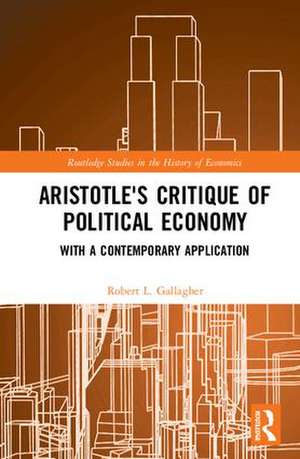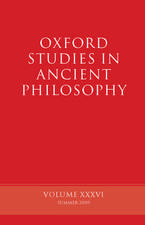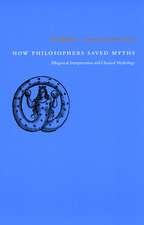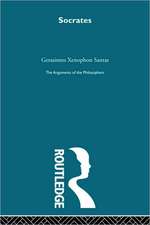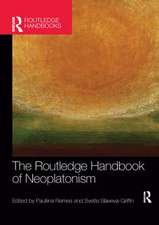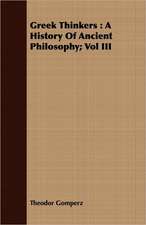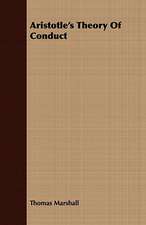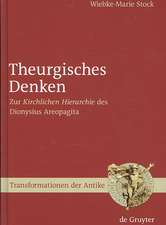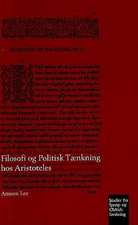Aristotle's Critique of Political Economy: With a Contemporary Application: Routledge Studies in the History of Economics
Autor Robert L. Gallagheren Limba Engleză Hardback – 6 iun 2018
The book considers how Aristotle’s work has been utilized by scholars including Marx, Polanyi, Rawls, Nussbaum and Sen to develop solutions to the problem of injustice. It then goes on to present a new Social Welfare Function (SWF) as an application of Aristotle’s theory. In exploring how Aristotle’s theories can be applied to contemporary social welfare analysis, the book offers a study that will be of relevance to scholars of the history of economic thought, political theory and the philosophy of economics.
| Toate formatele și edițiile | Preț | Express |
|---|---|---|
| Paperback (1) | 385.08 lei 6-8 săpt. | |
| Taylor & Francis – 30 sep 2020 | 385.08 lei 6-8 săpt. | |
| Hardback (1) | 1001.84 lei 6-8 săpt. | |
| Taylor & Francis – 6 iun 2018 | 1001.84 lei 6-8 săpt. |
Din seria Routledge Studies in the History of Economics
-
 Preț: 378.26 lei
Preț: 378.26 lei -
 Preț: 316.51 lei
Preț: 316.51 lei -
 Preț: 302.55 lei
Preț: 302.55 lei - 9%
 Preț: 1003.12 lei
Preț: 1003.12 lei -
 Preț: 324.46 lei
Preț: 324.46 lei -
 Preț: 311.28 lei
Preț: 311.28 lei -
 Preț: 326.99 lei
Preț: 326.99 lei -
 Preț: 326.82 lei
Preț: 326.82 lei -
 Preț: 665.69 lei
Preț: 665.69 lei - 9%
 Preț: 935.40 lei
Preț: 935.40 lei -
 Preț: 395.82 lei
Preț: 395.82 lei -
 Preț: 280.74 lei
Preț: 280.74 lei -
 Preț: 318.31 lei
Preț: 318.31 lei -
 Preț: 392.72 lei
Preț: 392.72 lei - 8%
 Preț: 392.82 lei
Preț: 392.82 lei -
 Preț: 310.43 lei
Preț: 310.43 lei -
 Preț: 214.15 lei
Preț: 214.15 lei -
 Preț: 399.71 lei
Preț: 399.71 lei -
 Preț: 157.37 lei
Preț: 157.37 lei - 26%
 Preț: 850.91 lei
Preț: 850.91 lei - 27%
 Preț: 995.39 lei
Preț: 995.39 lei - 18%
 Preț: 1005.04 lei
Preț: 1005.04 lei - 18%
 Preț: 1002.60 lei
Preț: 1002.60 lei - 28%
 Preț: 1046.46 lei
Preț: 1046.46 lei - 18%
 Preț: 1280.31 lei
Preț: 1280.31 lei - 18%
 Preț: 1055.51 lei
Preț: 1055.51 lei - 18%
 Preț: 1055.51 lei
Preț: 1055.51 lei - 28%
 Preț: 987.72 lei
Preț: 987.72 lei - 25%
 Preț: 824.17 lei
Preț: 824.17 lei - 18%
 Preț: 1061.93 lei
Preț: 1061.93 lei - 18%
 Preț: 716.32 lei
Preț: 716.32 lei - 18%
 Preț: 1006.07 lei
Preț: 1006.07 lei - 18%
 Preț: 1069.92 lei
Preț: 1069.92 lei - 12%
 Preț: 342.67 lei
Preț: 342.67 lei - 18%
 Preț: 1056.00 lei
Preț: 1056.00 lei - 28%
 Preț: 991.34 lei
Preț: 991.34 lei - 18%
 Preț: 1076.53 lei
Preț: 1076.53 lei - 18%
 Preț: 698.08 lei
Preț: 698.08 lei - 22%
 Preț: 332.02 lei
Preț: 332.02 lei - 18%
 Preț: 1169.78 lei
Preț: 1169.78 lei - 18%
 Preț: 1059.84 lei
Preț: 1059.84 lei - 30%
 Preț: 852.88 lei
Preț: 852.88 lei - 25%
 Preț: 830.10 lei
Preț: 830.10 lei - 18%
 Preț: 1119.93 lei
Preț: 1119.93 lei - 18%
 Preț: 1062.98 lei
Preț: 1062.98 lei - 18%
 Preț: 953.01 lei
Preț: 953.01 lei
Preț: 1001.84 lei
Preț vechi: 1221.75 lei
-18% Nou
Puncte Express: 1503
Preț estimativ în valută:
191.69€ • 200.17$ • 158.30£
191.69€ • 200.17$ • 158.30£
Carte tipărită la comandă
Livrare economică 15-29 aprilie
Preluare comenzi: 021 569.72.76
Specificații
ISBN-13: 9781138644717
ISBN-10: 1138644714
Pagini: 242
Ilustrații: 24
Dimensiuni: 156 x 234 x 14 mm
Greutate: 0.5 kg
Ediția:1
Editura: Taylor & Francis
Colecția Routledge
Seria Routledge Studies in the History of Economics
Locul publicării:Oxford, United Kingdom
ISBN-10: 1138644714
Pagini: 242
Ilustrații: 24
Dimensiuni: 156 x 234 x 14 mm
Greutate: 0.5 kg
Ediția:1
Editura: Taylor & Francis
Colecția Routledge
Seria Routledge Studies in the History of Economics
Locul publicării:Oxford, United Kingdom
Public țintă
Postgraduate and UndergraduateCuprins
PART I Post-Enlightenment Aristotelian theorists of political economy. 1. Karl Marx: "The Aristotle of the nineteenth century". 2. Karl Polanyi. 3. John Rawls. 4. Amartya Sen. 5. Martha Nussbaum. PART II Aristotle’s critique of political economy. 6. The metaphysical foundations of Aristotle’s critique of political economy. 7. Living well versus mere living: The bifurcation of the community. 8. Incommensurability and Aristotle’s theory of value. 9. Reciprocity and reciprocal justice. 10. Grace in Aristotle’s theory of exchange. PART III Contemporary application. Social welfare analysis: theory. 11. The state of social welfare analysis. 12. Derivation of an Aristotelian Social Welfare Function. PART IV Contemporary application. Social welfare analysis: application. 13. Estimating values of an Aristotelian Social Welfare Function. 14. Quantitative studies in an Aristotelian Social Welfare Function. Conclusion.
Notă biografică
Robert L. Gallagher is Director of the Eudemian Institute and Honorary Research Associate at the Institute for Philosophy and Social Theory, University of Belgrade, Serbia. Dr Gallagher lives in Lebanon.
Recenzii
"This book is uniquely relevant for current debates on globalization, income distribution and social welfare. It is of particular interest to readers concerned with contemporary issues in philosophy and political economy."
- Leo Michelis, Ryerson University, Canada
‘This book is an outstandingly detailed study of Aristotle’s economic thought as it relates to his metaphysics, ethics and politics […] Gallagher puts forward provocative, well-argued ideas and hypotheses through a thorough and methodical analysis of Aristotle’s texts (almost all of them translated from the original Greek by Gallagher himself). […] Gallagher’s book introduces a stimulating approach to Aristotle’s political economy, shedding light on a possible diagnosis and a therapy for current economic problems.’
- Ricardo Crespo, Universidad Austral, Argentina, in History of Economic Thought and Policy
- Leo Michelis, Ryerson University, Canada
‘This book is an outstandingly detailed study of Aristotle’s economic thought as it relates to his metaphysics, ethics and politics […] Gallagher puts forward provocative, well-argued ideas and hypotheses through a thorough and methodical analysis of Aristotle’s texts (almost all of them translated from the original Greek by Gallagher himself). […] Gallagher’s book introduces a stimulating approach to Aristotle’s political economy, shedding light on a possible diagnosis and a therapy for current economic problems.’
- Ricardo Crespo, Universidad Austral, Argentina, in History of Economic Thought and Policy
Descriere
This book presents a positive account of Aristotle’s theory of political economy, arguing that it contains elements that may help us better understand and resolve contemporary social and economic problems. In exploring how Aristotle’s theories can be applied to contemporary social welfare analysis, the book offers a study that will be of relevance to scholars of the history of economic thought, political theory, and the philosophy of economics.
